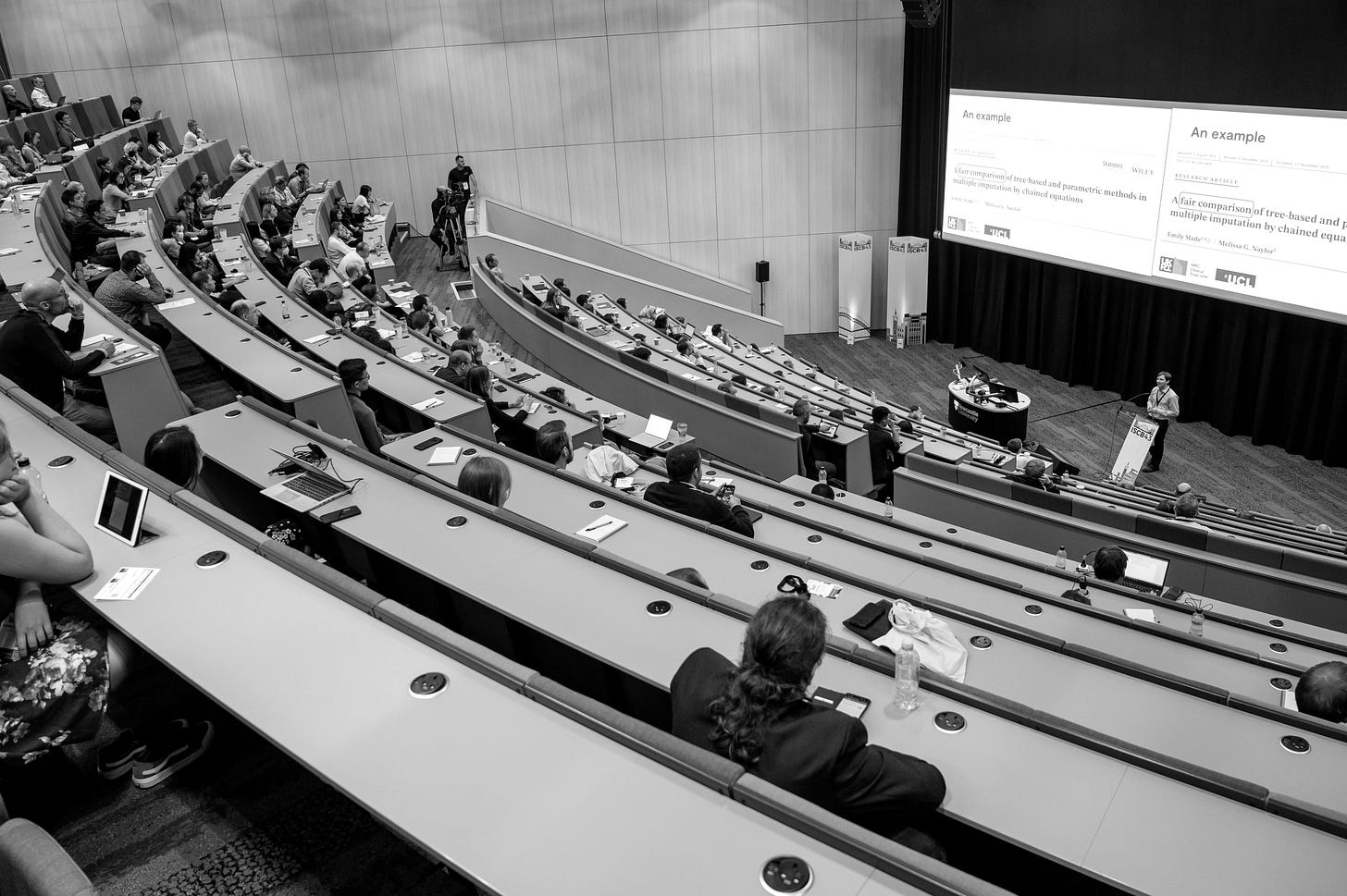Love it or hate it, presenting our work is a key feature of many researchers’ jobs. I give roughly 10–20 presentations about research each year. I tend to enjoy presenting but there is a time cost to preparing and delivering a presentation.
A couple of months ago, I listened to Dr. Alexander Schacht’s excellent podcast on delivering better presentations. I enjoyed liked Giusi Moffa’s recent LinkedIn post (particularly ‘Listen before you speak’), and Stephen Senn’s comment on it. These things made me think about a small workshop for early-career researchers a couple of years ago. The organisers had invited a handful of senior folks to talk about how we prepare for a presentation. The other presenters were more senior than me so I was surprised when their talks revolved around dealing with nerves, fitting in all the points you want to make without dumbing down, ensuring you run to time, slide design1, practicing and iterating your talk, scoping out the space you are presenting in, contingency plans for technical hitches, and so on. All important points, particularly for people who do not frequently give presentations.
The only real advice I gave was this: when planning a talk, my big question is what do I want to get out of this. If this comes across as transactional, you are correct.
Here is why you might find it a helpful prompt:
It can help you decide not to give the talk (if you have the option to decline).
It stops you feeling so concerned about how you come across to your audience. You are not performing for judges to hold up score cards at the end! You are a person who is expecting something in return for their preparation2.
Importantly, the answer to this question should dictate how you prepare.
What do I want to get out of giving this presentation?
Once you have given yourself a satisfactory answer, you can plan accordingly. Here are some of answers I’ve given myself over the last couple of years:
To get feedback on ideas before they solidify.
For people to learn and remember messages or principles (quite a standard reason).
To inspire people to take an interest in this topic.
To be impressive3 – come across as an articulate, expert and entertaining speaker – so people remember me or the group I am representing.
To minimise time spent preparing because it was not optional, though I would have liked to decline.
My employer will let me attend the conference if I present.
You will of course be able to think of plenty more, and there will usually be more than one reason.

I would love to hear what you focus on when preparing a presentation – please comment below! I’m always curious about this. I have attended a number of courses/workshops on presentation skills, and would attend more. There are always new things to think about and it’s often interesting to revisit things that are not new. It can also be instructive to study professional4 presenters – preachers, politicians, standup comedians, and Gary Lineker. How do they captivate audiences so effectively? For me, it’s with aspects like stories, humour, call backs, passion5, questions, and unpredictability6. None of these are things that courses teach us toinfuse in academic presentations but, as a listener, these aspects are what make me recall a presentation.
Knowing how to captivate your audience like a pro really helps if your reason for giving a talk is ‘to inspire people’ or ‘to be impressive’. Workshops tend to assume your reason for giving a talk is ‘for people to learn something and remember my messages’. So let me offer a caution. When your reason for giving a presentation is not one of these, it’s easy to operate as though it were. First, because we’re not really taught how to prepare for other reasons. (Saying that, if anyone fancies writing ‘7 tips for preparing for a presentation you didn’t want to give’ I will read it.) Second, because we would not want to be unimpressive, or not inspiring! But if you are just giving an update on progress for people who are already familiar with the ideas, then including things that would make a presentation memorable and impressive may prove an inefficient way to deliver it, and preparing will take an inordinate amount of your time.
So while you are preparing, think back to when you popped the question and remind yourself why you said yes in the first place.
It’s really useful when your employer has a specific template with their branding. Whether or not you like the template, it does mean you don’t have to think about it.
Tangential rant. We joke about ‘more of a comment than a question’ people. That’s because these comments are sometimes just used as a vehicle for a monologue by people who like the sound of their own voices. But not always, and I am often very happy to receive a genuine comments rather than a laboured comment-turned-into-a-question.
‘Be impressive’ may not be about you, but about your dept. or the group you are representing. I like and respect most of my collaborators so often want to big up their brilliant work!
I know what you’re thinking. If giving presentations about research is a critical part of a researcher’s job – which I did say – then researchers are ‘professional’ presenters too.
For me, passion is a real show-don’t-tell thing.
And they all know how to leave proper pauses!

